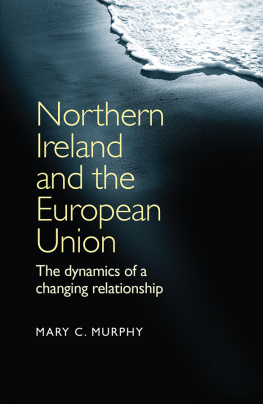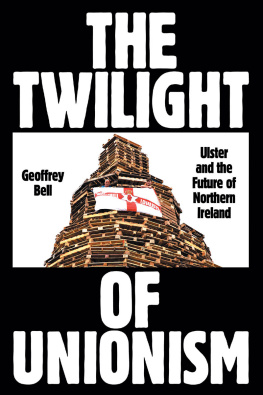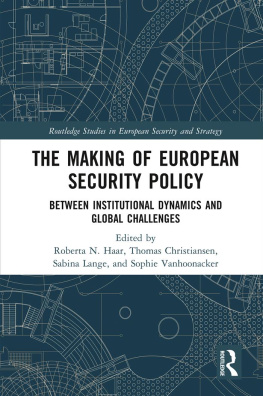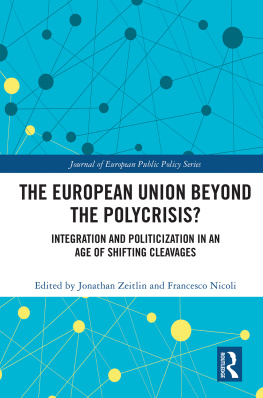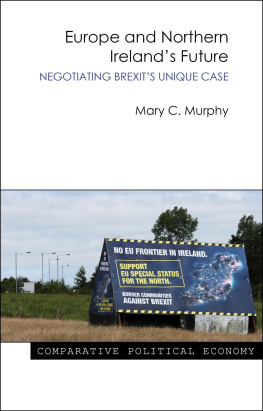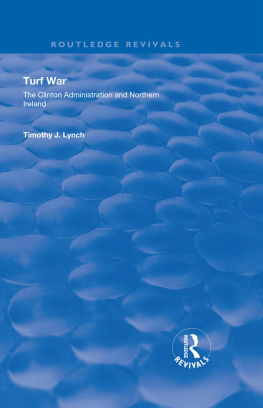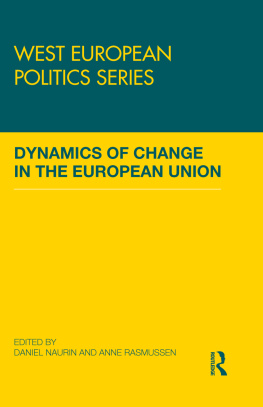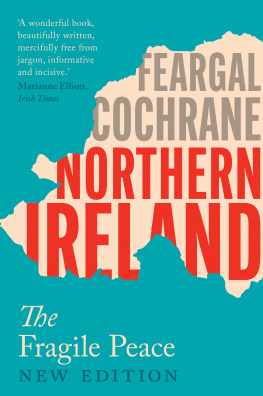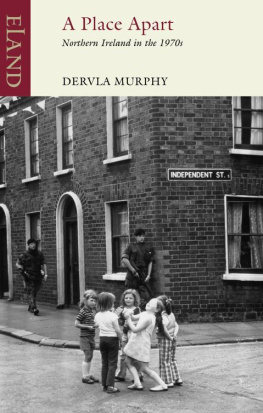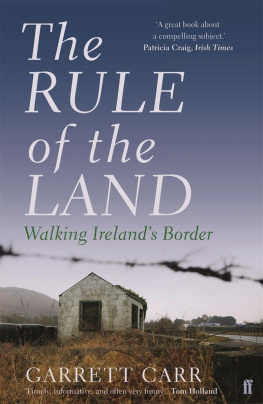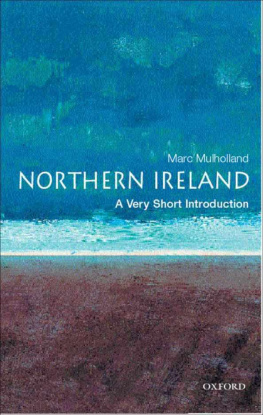Northern Ireland and the European Union
Northern Ireland and the European Union
The dynamics of a changing relationship
Mary C. Murphy
Manchester University Press
Manchester and New York
distributed in the United States exclusively by Palgrave Macmillan
Copyright Mary C. Murphy 2014
The right of Mary C. Murphy to be identified as the author of this work has been asserted by her in accordance with the Copyright, Designs and Patents Act 1988.
Published by Manchester University Press
Oxford Road, Manchester M13 9NR, UK
and Room 400, 175 Fifth Avenue, New York, NY 10010, USA
www.manchesteruniversitypress.co.uk
Distributed in the United States exclusively by
Palgrave Macmillan, 175 Fifth Avenue, New York,
NY 10010, USA
Distributed in Canada exclusively by
UBC Press, University of British Columbia, 2029 West Mall,
Vancouver, BC, Canada V6T 1Z2
British Library Cataloguing-in-Publication Data
A catalogue record for this book is available from the British Library
Library of Congress Cataloging-in-Publication Data applied for
ISBN 978 0 7190 7982 5 hardback
First published 2014
The publisher has no responsibility for the persistence or accuracy of URLs for any external or third-party internet websites referred to in this book, and does not guarantee that any content on such websites is, or will remain, accurate or appropriate.
Typeset by Special Edition Pre-Press Services
For my brother, Declan Murphy Jnr
Contents
| APNI | Alliance Party of Northern Ireland |
| BIC | British-Irish Council |
| BIS | Department of Business, Innovation and Skills (UK) |
| CAP | Common Agricultural Policy |
| CoR | Committee of the Regions |
| COSLA | Convention of Scottish Local Authorities |
| CRC | Conflict Resolution Centre |
| DARD | Department of Agriculture and Rural Development (Northern Ireland) |
| DCAL | Department of Culture, Arts and Leisure (Northern Ireland) |
| DECLG | Department of Environment, Community and Local Government (Ireland) |
| DEFRA | Department for Food, Environment and Rural Affairs (UK) |
| DEL | Department for Employment and Learning (Northern Ireland) |
| DETI | Department of Enterprise, Training and Investment (Northern Ireland) |
| DFP | Department of Finance and Personnel (Northern Ireland) |
| DOE(NI) | Department of the Environment (Northern Ireland) |
| DSD | Department of Social Development (Northern Ireland) |
| DUP | Democratic Unionist Party |
| EAGGF | European Agricultural Guidance and Guarantee Fund |
| EC | European Community |
| ECHR | European Convention on Human Rights |
| Ecosoc | Economic and Social Committee |
| ECU | European Currency Unit |
| EEC | European Economic Community |
| EP | European Parliament |
| EPCU | European Policy and Coordination Unit |
| ERDF | European Regional Development Fund |
| ESF | European Social Fund |
| FIFG | Financial Instrument for Fisheries Guidance |
| FMD | Foot and Mouth Disease |
| FP7 | EUs 7th Framework Programme for Research and Technological Development |
| GAA | Gaelic Athletic Association |
| GATT | General Agreement on Tariffs and Trade |
| GDP | Gross domestic product |
| GLA | Greater London Authority |
| GVA | Gross value added |
| IFA | Irish Farmers Association |
| IFB | Intermediary Funding Body |
| IFI | International Fund for Ireland |
| IRA | Irish Republican Army |
| IRep | Irish Permanent Representation |
| JMC[E] | Joint Ministerial Committee on Europe |
| MAFF | Multi-annual financial framework |
| MEP | Member of European Parliament |
| MLA | Member of the Legislative Assembly |
| MLG | Multi-level governance |
| MOU | Memorandum of Understanding |
| NGO | Non-Governmental Organisation |
| NI | Northern Ireland |
| NICE | Northern Ireland Centre in Europe |
| NICS | Northern Ireland Civil Service |
| NILGA | Northern Ireland Local Government Association |
| NIO | Northern Ireland Office |
| NITF | Northern Ireland Task Force |
| NRP | National Reform Programme (UK) |
| NSMC | North-South Ministerial Council |
| OFMDFM | Office of the First Minister and Deputy First Minister |
| ONIEB | Office of the Northern Ireland Executive in Brussels |
| PfG | Programme for Government |
| QUB | Queens University Belfast |
| R&D | Research and Development |
| RDP | Rural Development Programme |
| RPA | Review of Public Administration |
| SDLP | Social Democratic and Labour Party |
| SEA | Single European Act |
| SEM | Single European Market |
| SEUPB | Special EU Programmes Body |
| SNP | Scottish National Party |
| TEU | Treaty on European Union |
| TUV | Traditional Unionist Voice |
| UFU | Ulster Farmers Union |
| UKRep | United Kingdom Permanent Representation |
| UUP | Ulster Unionist Party |
I would like to thank my colleagues in the Department of Government, University College Cork, for their support and encouragement. A special thanks to all who gave of their time and insights during interviews for this book. Their contributions have been of immense value and have greatly enhanced the breadth and depth of the analysis. I am also grateful to the anonymous reviewer for valuable advice and guidance.
Thank you too to colleagues in the profession who advised (and often reassured) me. The students whom I have met and taught down through the years also provided ideas and inspiration. Friends, particularly in Cork and Belfast, were hugely supportive especially during the final stages of writing this book.
I am also grateful to the team at Manchester University Press, particularly Tony Mason and Corinne Orde.
A final word of thanks to my parents and family for their love, friendship and support. A special mention for my youngest brother Declan Murphy Jnr. Declan has an enormous interest in politics and follows my work closely. Indeed, I think he might just be my biggest fan! He in turn, for all sorts of reasons, is my biggest inspiration and to him I dedicate this book.
Mary C. Murphy
Cork, Ireland
In the years since the United Kingdom (UK) joined the European Union (EU) in 1973, Northern Ireland has endured bloody conflict, confronted profound political challenges and, more recently, experienced remarkable change. The journey from violent political conflict to a tentative peace has been long and arduous. It has demanded great compromise and sacrifice of all sections of Northern Ireland society. The result has been the removal of large-scale and widespread violence and the creation of new and legitimate devolved political institutions built around consociational principles. This process of peace-building has been accompanied by improved community relations and some degree of economic progress. The precise start date of this journey of change is difficult to pinpoint, but it has been visibly underway since the 1994 paramilitary ceasefires and the signing of the : 629).

